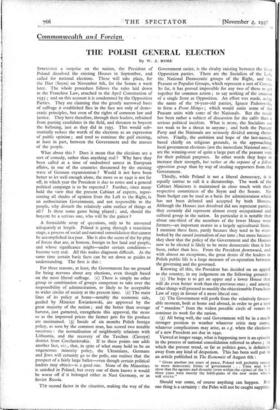THE POLISH GENERAL ELECTION
Commonwealth and Foreign By W. J.' ROSE understanding. The first is this : political campaign is to be expected ? Further, since many hold the view that the present Cabinet of experts, repre- people, why disturb the relatively calm surface of things at and whose significance might—under certain conditions— same time certain basic facts can be set down as guides to sort of comedy, rather than anything real ? Why have they been called at a time of undoubted unrest in European affairs, - in one of the countries threatened by the existing wave of German expansionism ? Would it not have been better to let well enough alone, the more so as 1940 is not far senting all shades of opinion from the Left to the Right, is an authoritarian Government, and not responsible to the all ? Is there some game being played ; and, should the boycott be a serious one, who will be the gainer ? of forces that are, at bottom, foreign to her land and people, become very real. All this makes diagnosis difficult. At the off, in which year the President is due to retire and a general adequately at length. Poland is going through a transition stage, a process of social and national consolidation that cannot be accomplished in a year. She is also the scene of the by-play A formidable array of questions, only to be answered For three reasons, at least, the Government has no ground Knowing all this, the President has decided on an appeal for being nervous about any elections, even though based to the country, in my judgement on the following grounds : on the most liberal suffrage. (x) There is simply no other (0 The hope is to get an upper and a lower House that group or combination of groups competent to take over the will do even better work than the previous ones ; and among responsibility of administration, or likely to be acceptable other things will proceed to modify the objectionable Franchise to wider circles of society at the present time. (2) The main Law of 1935 in favour of a more liberal one.
lines of its policy at home—notably the economic side, (2) The Government will profit from the relatively favour- guided by Minister Kwiatkowski, are approved by the able moment, both at home and abroad, in order to get a sort great majority of the nation ; and the better than average of " mandate " from the widest possible circle of voters to harvest, just garnered, strengthens this approval, the more continue its work for the nation.
so as the improved prices the farmer gets for his produce (3) All being well, the said Government will be in a much are maintained. (3) Inside of six months Polish foreign stronger position to weather whatever crisis may come, policy, as seen by the common man, has scored two notable whatever complications may arise, as e.g. when the elections successes : the normalisation of neighbourly relations with of a new President are due in 1940. Lithuania, and the recovery of the Teschen (Cieszyn) Viewed at longer range, what is happening now is an episode district from Czechoslovakia. If to these points one adds in the process of national consolidation referred to above ; in another fact, vie., that, in spite of what many hold to be an which the present trend, so far as politics goes, is definitely ungenerous minority policy, the Ukrainians, Germans away from any kind of despotism. This has been well put in and Jews will certainly go to the polls, one realises that the an article published in The Economist of August 6th : prospect of a fairly large ballot—even though certain political " Given another ten years of peace, Poland will probably return leaders may object—is a good one. None of the Minorities to more democratic forms of government . . . Time may well is satisfied in Poland, but every one of them knows it would three years were merely the birth-pains of the new order which be worse off if it belonged either in Nazi Germany, or in will evolve." with almost no exceptions, the great desire of the leaders in Polish public life is a large measure of co-operation between they certainly did represent almost every occupational and fanners—an important matter in a largely agricultural State. they show that the policy of the Government and the Houses the governing and the governed. has not been debated and accepted by both Houses. Although the Houses just dissolved did not represent parties, about one-third of the members of the lower House were looked by the casual journalism of our time ; but more because now to be elected is likely to be more democratic than it has been, rather than less. From the President downward, and respective committees of the Seym and the Senate. No cultural group in the nation. In particular it is notable that I mention these facts, partly because they tend to be over- for their political purposes. In other words they hope to equally untrue to call it a dictatorship. The work of the Cabinet Ministers is maintained in close touch with their State budget can be used as a basis for administration which increase their itrength, but .rather at the expense of a fellow opposition group than by way of stealing supporters froth the Government. Thirdly, while Poland is not a liberal democracy, it is show that the agonies and disunity (even within the regime) of the la










































 Previous page
Previous page